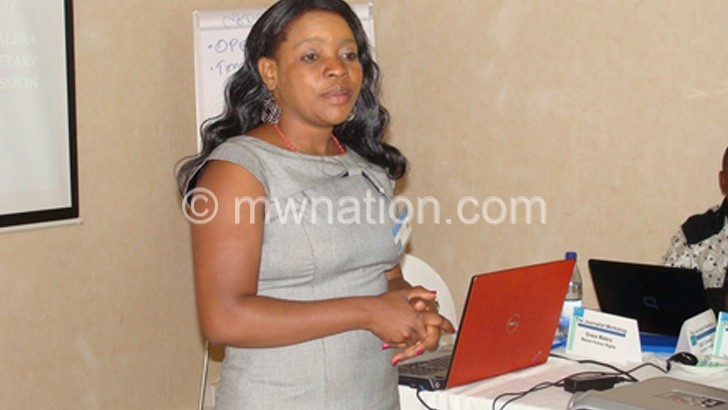MHRC takes APM to task
Government has been accused of muzzling the press and meting out violence to its opponents while doing nothing to investigate the gruesome murder of former Anti-Corruption Bureau (ACB) official Issa Njauju.
This has been said in a report by State-funded Malawi Human rights Commission (MHRC).
The report titled: ‘Report by the 6th Cohort of Commissioners to His Excellency President Peter Mutharika’, which Nation on Sunday has sourced, links punitive action taken on some media houses such as Times Media Group and Zodiak Broadcasting Station (ZBS) to the commission’s work.
MHRC executive secretary Grace Malera confirmed in an e-mailed response to a questionnaire that the body presented the report to President Mutharika during a meeting on Thursday at Sanjika Palace in Blantyre.

received by the President
She said the commissioners—who were led by their chair Justin Dzonzi—and Mutharika, had a constructive dialogue over contents of the report. But she fell short of revealing Mutharika’s responses on some of the critical issues raised.
Said Malera: “Yes, I can confirm that the report was submitted to the President by MHRC commissioners in line with the statutory functions and responsibilities of MHRC under the Human Rights Commission Act.
“The report was well received by the President and he furnished detailed responses to the issues raised in the report. A constructive dialogue ensued on issues relating to the progress the country has made in the promotion and protection of human rights, as well as the outstanding challenges and what needs to be done in the short and long-term, and the obligations of Government as the primary duty-bearer as well as MHRC in this regard.”
Government spokesperson Nicholas Dausi said in an interview, while some of the concerns, particularly on the murders of Polytechnic student Robert Chasowa and Njauju, were justified in the wake of delays to bring the culprits to book, the concerns on media freedom were unfounded.
“Perhaps I can say it is a justified concern for MHRC to report to the President on the issue of Njauju and Chasowa on the public views that people are still waiting for the truth of this matter; that is justified. However, as government, we are doing all we can to bring those responsible to book. The President has not wasted any moment to remind the Inspector General of Police of the need to expedite those investigations and get to the bottom of what happened.
“On the other hand, those killers apparently destroyed evidence, but, as government, we will eventually catch up with them. As a way of demonstrating our commitment, we have invited foreign forensic investigators to come and aid our search for the truth,” said Dausi, who is also Minister of Information.
On media freedom, Dausi was more dismissive of the concerns raised, saying government was committed to free press and the cited cases have nothing to do with a meddling government.
Media Institute of Southern Africa (Misa) Malawi Chapter chairperson Thom Khanje said the MHRC assessment on the media landscape reflects the body’s own position, particularly on the issue of Times Media Group and ZBS.
“Yes. We agree. That is why we issued a statement on the Times closure. We also wrote Macra against the charges on ZBS,” said Khanje.
The report notes that under the current administration, access to information and media freedom have particularly come under threat, citing a campaign to silence critical voice in the media and frustrate the passing into law of the Access to Information (ATI) Bill.
In particular, the report cites the recent closure by Malawi Revenue Authority (MRA) of Times Media Group and fining of Zodiak Broadcasting Station (ZBS) as politically-motivated persecution of the media while these bodies appear “seemingly executing their rightful roles.”
Reads part of the report: “The Constitution provides that the press shall have the right to report and publish freely, within Malawi and abroad and to be accorded the fullest possible facilities for access to information. Contrary to this provision, the media in Malawi has come under constant attacks, especially from the DPP [Democratic Progressive Party] officials and top government officials through public statements against specific media houses which are deemed to be critical of government and the DPP.
“The commission is concerned with the selective conduct that has been demonstrated by some of the public regulatory bodies such as Macra [Malawi Communications Regulatory Authority] and MRA, who, while seemingly executing their rightful roles, have been seen to be targeting media institutions that have been publicly labelled to be critical of the government.”
It adds: “The recent closure by MRA of Times Group is one glaring example of deep concern, especially as it comes not long after the media house has been publishing stories about alleged corruption in the buying of maize by Admarc from Zambia. The members of the general public have questioned why the actions by MRA and Macra have only targeted Times Group and not the rest of the media houses.”
The commission urges Mutharika to expedite the process of assenting to the ATI and condemns increase in politically-motivated violence, failure to bring to book those responsible for the death of the Polytechnic student Chasowa, and Njauju.
On Njauju and Chasowa, the commission has no kind words for the actions of the State, noting the commission has “variously engaged relevant authorities on the needed action on these matters, with little or no appropriate actions on the part of such authorities.”
While welcoming the opening up of the extractive industry, the commission notes that lack of transparency and archaic legislation threatens any gains to be made in the sector and calls for new legislation and a competitive process of bidding for exploration. and mining rights as remedies. n





